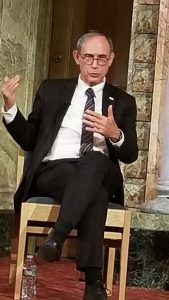 Nachman Shai, Israel’s Minister of Diaspora Affairs, came to the United States in December of 2021 on a bridge-building mission. During a whirlwind east coast tour, he met with leaders of major Jewish denominations in New York, policy leaders in Washington DC, and delegates to the Israeli American Council convention in Florida. He detailed a range of anticipated changes in Israeli policies towards Diaspora Jewry. He assured that the Reform and Conservative movements, as well as multiple Jewish organizations, will, for the first time, receive funding from the Israeli government. Some forty Jewish organizations will share 30 million shekels.
Nachman Shai, Israel’s Minister of Diaspora Affairs, came to the United States in December of 2021 on a bridge-building mission. During a whirlwind east coast tour, he met with leaders of major Jewish denominations in New York, policy leaders in Washington DC, and delegates to the Israeli American Council convention in Florida. He detailed a range of anticipated changes in Israeli policies towards Diaspora Jewry. He assured that the Reform and Conservative movements, as well as multiple Jewish organizations, will, for the first time, receive funding from the Israeli government. Some forty Jewish organizations will share 30 million shekels.
Prior to the 2021 Jewish High Holidays, Minister Shai had suggested that rabbis speak about “the bonds between us, as a Jewish people, about our shared past and imagined future,” in their High Holiday sermons. Israel, he said, “is committed to learning and understanding how our actions impact your communities…we are a people with a common fate and destiny” noting that 2020 had “highlighted just how intertwined we are as a people … work(ing) together to ensure ongoing safety, security and communal cohesion.” The Minister acknowledged Israel’s “responsibility for our side of the relationship in a way that you have never seen.”
A matter of significant concern to non Orthodox Jewish denominations is the establishment of a permanent mixed gender prayer platform at the Kotel (Western Wall) for egalitarian worshipers. In the main plaza, which is under the jurisdiction of an Orthodox foundation, men and women must worship separately, and women are not allowed to read from the Torah.
In 2016, a “Western Wall Compromise” agreement was reached between the Netanyahu government and pluralistic diaspora Jewish leaders. In 2017, however, the hard won agreement was shelved. Resuscitation and implementation of the Kotel compromise was integral to the participation of the centrist Blue and White party in the formation of Israel’s coalition government.
During a press conference at the Israeli Consulate in New York City, Jewish Views asked Minister Shai about implementation of the Western Wall Compromise. Shai assured that the construction of the permanent “prayer pavilion” was a priority of the current Israeli government, and would proceed.
Shai assured that the construction of the permanent “prayer pavilion” was a priority of the current Israeli government, and would proceed.
Less than one week after this position was enthusiastically voiced, Israeli Prime Minister Naftali Bennett, and Minister of Religious Affairs Matan Kahana, announced a reversal: plans for the egalitarian prayer space were suspended once again.
Israel’s constantly fragile government seems unwilling to confront right-wing elements, and the ultra-Orthodox, including Aryeh Deri’s Shas party, who calls the Compromise “a declaration of war on the country’s Jewish identity.” Violent demonstrations during the Rosh Hodesh (New Month) celebration, appear to have derailed the agreement once again.
Kahana was quoted by the Times of Israel’s Hebrew language platform, saying “We have decided to not deal with this now, period…The Western Wall compromise has become a focus for incitement and hatred, especially by people from Likud, who are latching onto it. We cannot play into their hands. We’re freezing everything at the moment. We’re not touching it. The matter is on the desks of Cabinet Secretary Shalom Shlomo and President Isaac Herzog.”
A source familiar with Israeli politics told Jewish Views that the government was not willing to have this issue become divisive, saying the government nonetheless remains committed to improving ties with Diaspora Jewry. Diaspora Minister Shai, and Member of Knesset Gilad Kariv, an ordained Reform Rabbi and center-left Labor party member, argued that Minister Kahana doesn’t have the authority to shelve the Western Wall compromise.
Egalitarian worshipers remain, despite recent, then quickly backtracked assurances, not quite up against the Wall.







